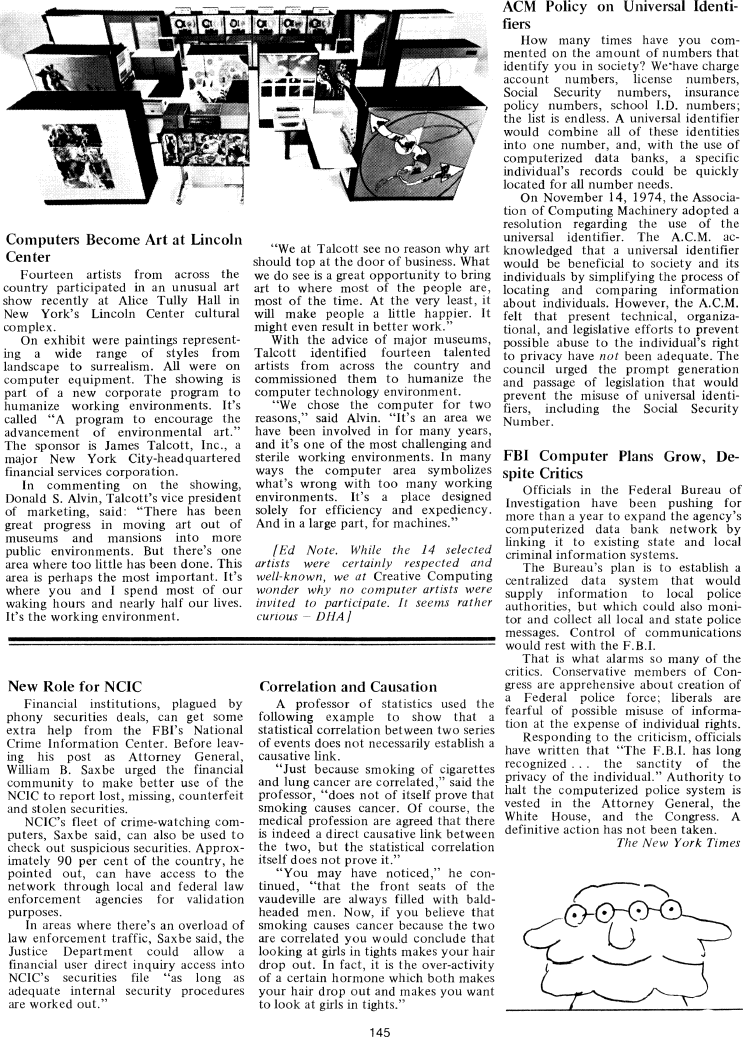The Best of Creative Computing Volume 1 (published 1976)
Creative Computing Compendium (Computers Become Art at Lincoln Center, New Role for FBI's National Crime Information Center, Correlation and Causation, ACM Policy on Universal Identifiers, FBI Computer Plans Grow Despite Critics)

[image]
Computers Become Art at Lincoln Center
Fourteen artists from across the country participated in an unusual art show
recently at Alice Tully Hall in New York's Lincoln Center cultural complex.
On exhibit were paintings representing a wide range of styles from landscape to
surrealism. All were on computer equipment. The showing is part of a new
corporate program to humanize working environments. It's called "A program to
encourage the advancement of environmental art." The sponsor is James Talcott,
Inc., a major New York City-headquartered financial services corporation.
In commenting on the showing, Donald S. Alvin, Talcott's vice president of
marketing, said: "There has been great progress in moving art out of museums and
mansions into more public environments. But there's one area where too little
has been done. This area is perhaps the most important. It's where you and I
spend most of our waking hours and nearly half of our lives. It's the working
environment.
"We at Talcott see no reason why art should top at the door of the business.
What we do see is a great opportunity to bring art to where most of the people
are, most of the time. At the very least, it will make people a little happier.
It might even result in better work."
With the advice of major museums, Talcott identified fourteen talented artists
from across the country and commissioned them to humanize the computer
technology environment.
"We chose the computer for two reasons," said Alvin. "It's an area we have been
involved in for many years, and it's one of the most challenging and sterile
working environments. In many ways the computer area symbolizes what's wrong
with too many working environments. It's a place designed solely for efficiency
and expediency. And in a large part, for machines."
[Ed. Note. While the 14 selected artists were certainly respected and
well-known, we at Creative Computing wonder why no computer artists were invited
to participate. It seems rather curious - DHA]
[image]
***
New Role for NCIC
Financial institutions, plagued by phony securities deals, can get some extra
help from the FBI's National Crime Information Center. Before leaving his post
as Attorney General, William B. Saxbe urged the financial community to make
better use of the NCIC to report lost, missing, counterfeit and stolen
securities.
NCIC's fleet of crime-watching computers, Saxbe said, can also be used to check
out suspicious securities. Approximately 90 per cent of the country, he pointed
out, can have access to the network through local and federal law enforcement
agencies for validation purposes.
In areas where there's an overload of law enforcement traffic, Saxbe said, the
Justice Department could allow a financial user direct inquiry access into
NCIS's securities file "as long as adequate internal security procedures are
worked out."
***
Correlation and Causation
A professor of statistics used the following example to show that a statistical
correlation between two series of events does not necessarily establish a
causative link.
"Just because smoking of cigarettes and lung cancer are correlated," said the
professor, "does not of itself prove that smoking causes cancer. Of course, the
medical profession are agreed that there is indeed a direct causative link
between the two, but the statistical correlation itself does not prove it."
"You may have noticed," he continued, "that the front seats of the vaudeville
are always filled with bald-headed men. Now, if you believe that smoking causes
cancer because the two are correlated you would conclude that looking at girls
in tights makes your hair drop out. In fact, it is the over-activity of a
certain hormone which both makes your hair drop out and makes you want to look
at girls in tights."
145
***
ACM Policy on Universal Identifiers
How many times have you commented on the amount of numbers that identify you in
society? We have charge account numbers, license numbers, Social Security
numbers, insurance policy numbers, school I.D. numbers; the list is endless. A
universal identifier would combine all of these identities into one number, and,
with the use of computerized data banks, a specific individual's records could
be quickly located for all number needs.
On November 14, 1974, the Association of Computing Machinery adopted a
resolution regarding the use of the universal identifier. The A.C.M.
acknowledged that a universal identifier would be beneficial to society and its
individuals by simplifying the process of locating and comparing information
about individuals. However, the A.C.M. felt that present technical,
organizational and legislative efforts to prevent possible abuse to the
individual's right to privacy have not been adequate. The council urged the
prompt generation and passage of legislation that would prevent the misuse of
universal identifiers, including the Social Security Number.
***
FBI Computer Plans Grow, Despite Critics
Officials in the Federal Bureau of Investigation have been pushing for more than
a year to expand the agency's computerized data bank network by linking it to
existing state and local criminal information systems.
The Bureau's plan is to establish a centralized data system that would supply
information to local police authorities, but which could also monitor and
collect all local and state police messages. Control of communications would
rest with the F.B.I.
That is what alarms so many of the critics. Conservative members of Congress are
apprehensive about creation of a Federal police force; liberals are fearful of
possible misuse of information at the expense of individual rights.
Responding to the criticism, officials have written that "The F.B.I. has long
recognized... the sanctity of the privacy of the individual." Authority to halt
the computerized police system is vested in the Attorney General, the White
House, and the Congress. A definitive action has not been taken.
The New York Times
[image]


